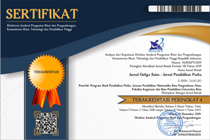Profile of Implementing Google Classroom As A SMK Physics Learning Media
Abstract
Learning management system (LMS) is a learning solution in the midst of the Covid-19 pandemic situation. In addition, the LMS learning media is also a medium that supports education in the demands of technological development 4.0. LMS is an online-based application designed to assist the learning process with creative and innovative material designs. LMS has many types, this time the researcher uses google classroom as a learning medium. The purpose of this research was to profile the application of physics learning using google classroom media at SMK Bodronoyo Jiwan, Madiun. The sample used was class X students majoring in APHP at SMK Bodronoyo Jiwan, Madiun. This research method is a descriptive qualitative data analysis model using the Technology Acceptance Model (TAM). The results of this research explain that the learning applied in class X APHP using google classroom gets a very good response. Obtaining this data states that on average students respond very satisfied, this is explained in 5 aspects, namely ease of access, perceived usefulness, communication and interaction, delivery of instructions, and student satisfaction on the application of Google Classroom in teaching and learning activities.
Keywords
Full Text:
PDFReferences
Ahmadi, M. R. (2018). The use of technology in English language learning: a literature review. International Journal of Research in English Education (IJREE), 3(2), 115–125.
Chung, C. H., Pasquini, L. A., & Koh, C. E. (2013). Web-based learning management system considerations for Higher education. Learning and Performance Quarterly, 1(4), 24–37.
Coates, H., James, R., & Baldwin, G. (2005). A critical examination of the effects of learning management systems on university teaching and learning. Tertiary Education and Management, 11(1), 19–36.
Daryanto, D. (2010). Media pembelajaran peranannya sangat penting dalam mencapai tujuan pembelajaran. Gava Media.
Emelyanova, N., & Voronina, E. (2020). Introducing a learning management system at a Russian university: students’ and teachers’ perceptions. International Review of Research in Open and Distributed Learning, 15(1), 1–19.
Gilakjani, A. P. (2017). A Review of the literature on the integration of technology into the learning and teaching of English language skills. International Journal of English Linguistics, 7(5), 95.
Hamuy, E., & Galaz, M. (2010). Information versus communication in course management system participation. Computers and Education, 54(1), 169–177.
Lee, B. C., Yoon, J. O., & Lee, I. (2009). Learners’ acceptance of e-learning in South Korea: theories and results. Computers and Education, 53(4), 1320–1329.
Legris, P., Ingham, J., & Collerette, P. (2003). Why do people use information technology? A critical review of the technology acceptance model. Information and Management, 40(3), 191–204.
Machado, M., & Tao, E. (2007). Machado2007.Pdf. December 2006, 7–12.
Mtebe, J. S. (2015). Learning management system success: increasing learning management system usage in higher education in sub-Saharan Africa. International Journal of Education and Development using Information and Communication Technology, 11(2), 51–64.
Murtikusuma, R. P., Hobri, Fatahillah, A., Hussen, S., Prasetyo, R. R., & Alfarisi, M. A. (2019). Development of blended learning based on google classroom with using culture theme in mathematics learning. Journal of Physics: Conference Series, 1165(1), 1–8.
Octaberlina, L. R., & Muslimin, A. I. (2020). Efl students perspective towards online learning barriers and alternatives using moodle/google classroom during covid-19 pandemic. International Journal of Higher Education, 9(6), 1–9.
Okmawati, M. (2020). The use of google classroom during pandemic. Journal of English Language Teaching, 9(2), 439–443.
Pratiwi, A. E., & Trisnawati, N. (2021). Respon siswa terhadap penggunaan google classroom pada mata pelajaran OTK humas dan keprotokolan. Journal of Office Administration : Education and Pratice, 1(1), 28–41.
Pratiwi, S. N., Cari, C., & Aminah, N. S. (2019). Pembelajaran IPA abad 21 dengan literasi sains siswa. Jurnal Materi dan Pembelajaran Fisika (JMPF), 9(1), 34–42.
Ramdhani, M. A., Aulawi, H., Ikhwana, A., & Mauluddin, Y. (2017). Model of green technology adaptation in small and medium-sized tannery industry. Journal of Engineering and Applied Sciences, 12(4), 954–962.
Shaharanee, I. N. M., Jamil, J. M., & Rodzi, S. S. M. (2016). The application of google classroom as a tool for teaching and learning. Journal of Telecommunication, Electronic and Computer Engineering, 8(10), 5–8.
Shahroom, A. A., & Hussin, N. (2018). Industrial revolution 4.0 and education. International Journal of Academic Research in Business and Social Sciences, 8(9), 314–319.
Syakur, A., Sugirin, S., & Widiarni, W. (2020). The effectiveness of English learning media through google classroom in higher education. Britain International of Linguistics Arts and Education (BIoLAE) Journal, 2(1), 475–483.
Uys, P. M. (2010). Implementing an open-source learning management system: A critical analysis of change strategies. Australasian Journal of Educational Technology, 26(7), 980–995.
Wang, Q., Woo, H. L., Quek, C. L., Yang, Y., & Liu, M. (2012). Using the Facebook group as a learning management system: An exploratory study. British Journal of Educational Technology, 43(3), 428–438.
Watson, W. R., & Watson, S. L. (2007). An argument for clarity: What are learning management systems, what are they not, and what should they become? TechTrends, 51(2), 28–34.
Webster, J., & Hackley, P. (1997). Technology-mediated distance learning. Academy of Management Journal, 40(6).
Wijaya, C. A., Handhika, J., & Kartikawati, S. (2017). Pengembangan media pembelajaran pengendali kecepatan dan soft starting motor listrik berbasis arduino pada mata kuliah penggunaan dan pengaturan motor. JUPITER(Jurnal Pendidikan Teknik Elektro), 2(2), 15–20.
Yolandari, A., Meuthia, R. F., & Fontanella, A. (2020). Penerapan e-learning platform google classroom untuk menjawab tantangan revolusi industri 4 . 0 (studi kasus di jurusan akuntansi politeknik negeri padang). Jurnal Akuntansi dan Manajemen, 15(2), 141–155.
DOI: http://dx.doi.org/10.31258/jgs.9.1.12-18
Refbacks
- There are currently no refbacks.
Copyright (c) 2021 Intan Fatmawati, Dwi Sulisworo

This work is licensed under a Creative Commons Attribution 4.0 International License.
Jurnal ini terdaftar dan terindeks pada:
- Crossref
- Google Scholar
- Crossref
- Garuda
- Sinta
- Researchgate
- Dimensions
- Base
- Scilit
- OneSearch
- Road
- CiteFactor
- ResearchBib
- WorldCat



















